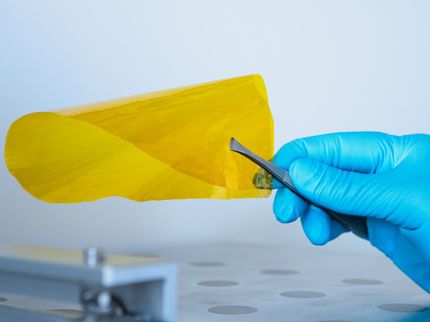Bi-fuel hydrogen injection in conventional diesel engines as an option for the use of green hydrogen in shipping
Advertisement
In autumn 2024, the Maritime, Plant Engineering and Logistics department at the Warnemünde site achieved a key sub-goal in the research project "Use of offshore H2 in coastal shipping" - known as OH22KuesSe for short. In a conventionally operating single-cylinder diesel engine extended with control and measurement technology components for research purposes, fossil fuels were replaced by hydrogen during operation. This proved that even conventional diesel engines, such as those used at sea, can be retrofitted with a separate, autonomous H2 injection system that can be switched off.

Test set-up on the classic diesel engine, above which the hydrogen collection tray with sensor is located. The HP injection valve can be seen in the hand.
Kerstin Baldauf / Hochschule Wismar

The gas supply system allows a hydrogen supply of up to 200 bar to supply experiments. Nitrogen is used as the internal gas for purging.
Kerstin Baldauf / Hochschule Wismar


The reduction in CO2 was clearly demonstrated and optimum operating points for this process were determined. The project, which is funded with around 450,000 euros, will run for around six months, until March 2025. It is embedded in the German government's H2Mare flagship project, in which the production of hydrogen directly at sea (offshore) is being investigated. The aim of this flagship project is to produce hydrogen directly at sea in wind farms, combined with the direct use of hydrogen in the maritime sector.
Optimism despite contradictions
"We are well on the way to an exciting project to bring hydrogen on board as an efficient energy source," says project manager Prof. Dr.-Ing. "The declared aim of the individual project is to find potentially favorable applications for the direct use of hydrogen on existing ships and thus to use offshore hydrogen and promote the development of a refueling infrastructure," the professor continues. "In the long term, fuel cells will win the race due to their better efficiency." The expert disagrees with the general view that hydrogen cannot generally be used in shipping. Around 90,000 conventional ships are currently sailing the seas and have to meet the requirements of the Energy Efficiency for Existing Ships Index (EEXI). The (EEXI) is a measure introduced by the International Maritime Organization (IMO) to reduce greenhouse gas emissions from ships, which relates to the technical design of a ship. From today's perspective, some routes and ships appear to be suitable for the use of hydrogen. In order to find these, the first phase of the project involved recording and classifying the existing fleet of seagoing vessels. In the next step, a supply concept (on land and on board) will be drawn up for the most suitable class. The rules defined by classification societies, which are currently being developed and must be observed in ship operation, will also be identified.
Prof. Rafoth sees the biggest problem for the use of green energy sources in the ultimately low price of fossil fuels, which are known to be limited and which he expects to be available for a maximum of 100 to 200 years. At 2 to 4 cents/kWh, their price is currently on average around 30 to 50 percent of the price for renewable energies at 4 to 8 cents/kWh. In Prof. Rafoth's opinion, a CO2 levy of 45 euros/t, which would correspond to a surcharge of around 0.8 cents/kWh, would hardly bring about any change, which is why he expects further initiatives from politicians.
Note: This article has been translated using a computer system without human intervention. LUMITOS offers these automatic translations to present a wider range of current news. Since this article has been translated with automatic translation, it is possible that it contains errors in vocabulary, syntax or grammar. The original article in German can be found here.



























































